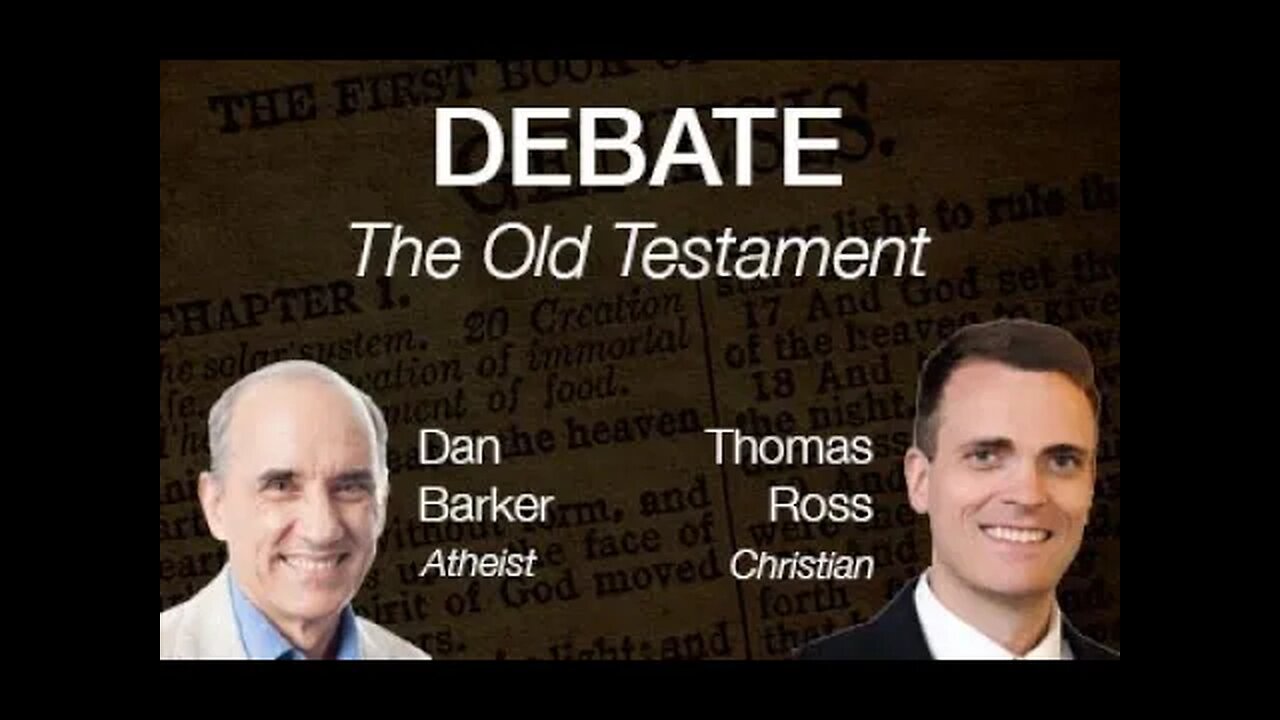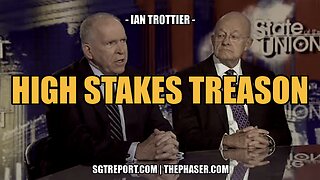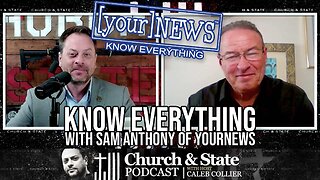Premium Only Content

Dan Barker / Thomas Ross Debate: The Old Testament, Fact or Fiction? (1 of 2)
"The Old Testament is Mainly Fiction, not Fact," is part 1 of a debate at the University of Wisconsin, Whitewater between Dan Barker (atheist & president of the Freedom From Religion Foundation or FFRF) and Thomas Ross (Independent Baptist seminary professor, Bible-believing Christian, and follower of Jesus Christ). Part 2 is "Prophecy and Archaeology Validate the Bible as the Word of God.” FaithSaves.net contains the book on Daniel referenced, debate transcripts, and a review of arguments made. The debate terms stated the discussion was over: “[T]he fictional or factual character of the vast general body of the Old Testament . . . over history/prophecy/archaeology, not over creation/evolution and Genesis 1-11, prehistory, geology, or biology. Those would be worthwhile debates but they are for another time.”
Note also Dr. Ross’s debates “The New Testament Picture of Jesus: Is it Accurate?” with Shabir Ally and "Does History Validate the Accuracy of the New Testament?" with Benjamin Maisonet, president of the atheist organization PATAS.
Dan Barker has been endorsed by Richard Dawkins, Daniel Dennett, Christopher Hitchens, Hector Avalos, Michael Shermer, and other leading atheists. Thomas Ross is a leading independent Baptist scholar.
In part one of the debate, Barker attacked God as immoral. Promoting his book God: The Most Unpleasant Character in All Fiction, Barker said the Old Testament was filicidal, condoning human sacrifice of one's children. He cited miracles in Genesis 1-11 and Baalam's talking donkey, saying donkeys do not have vocal cords so God could not make the animal speak. Barker said there is no archaeological or literary evidence for any of the stories in the Old Testament; rather, it contains anachronisms such as domesticated camels. He claimed "Israel Finkenstein" [sic] had proved that "none of these stories has any archaeological evidence at all." Rather, the Israelites were “copying and mimicking stories” from “ancient mythology.” Relying on Dorothy Milne Murdock's book Did Moses Exist? Dan Barker argued for a mythicist view of the Old Testament, claiming that it fit into the genre of historical fiction.
Following Murdock (Acharya S), Barker argued that there were at least 50 or 60 other law givers and reformers in that time with two-syllable names starting with the letter M, from Manis in Phrygia, to Mannus in Germany, to Manu in India, Minos in Crete, Menes and Monius in Egypt, and Musaeus in Greece. Pagan myths and ancient mythology had people cross seas, innocent people dying, people wandering in a wilderness, and laws from the top of a mountain. Even Egyptian pygmies had a mountaintop myth of going up to get the law from their God. All of these "ancient pagan myths of the time" were sources for the legend of Moses. What is more, a myth of the Persian god Mithra explain the Pentateuch's statement that water came out from a rock when Moses struck it. Such mythicism is a "good naturalistic explanation" for the Old Testament. (See part 2 of the debate and the review at FaithSaves for more on claimed pagan sources.)
Ross did not respond extensively to Dan Barker's arguments from Genesis 1-11 and morality based on the debate terms and conditions. He responded extensively to the pagan parallelism argument in part 2 of their debate. He responded to the claim of the non-existence of domesticated camels by supplying evidence for them from Ur, Byblos, Syria, Rifeh and Pi-Ramesses in Egypt, and Arabia. He pointed out that Barker's main objection to the Bible is rebellion, not dispassionate intellectual reasoning. Barker proclaimed: "Even if Jesus ... rose from the dead [and] there’s a God [and] I don’t deny any of that ... does NOT mean that he is my Lord. ... I will go happily to hell. It would be worse of a hell for me to bow down before a Lord ... regardless of the ... historicity issue. ... Even if I agreed 100%, I would still reject that Being as a Lord of my life ... to live and enjoy ... life unshackled from the demands ... [of a] Lord. ... I cannot accept Jesus as Lord. ... To me, I think that’s more important than all this historicity stuff, [in] which ... I might be wrong."
Ross argued that the Bible contains predictive prophecy, validating that it was God's Word. As God's Word, it must be historically accurate. He developed his case in both parts of the debate. In part 1, he claimed the book of Daniel contained many extremely specific prophecies that could not have been made by chance, such as many details about the Babylonian, Medo-Persian, Greek and Roman empires, details about the times of Antiochus Epiphanes, the exact year and day Christ presented Himself as the Messiah in the 70 weeks prophecy of Daniel 9, and others. Daniel 11 alone has over 135 specific predictions. Barker responded that "when Daniel writes, he doesn't mention any names," and utilizing 360 day years invalidated the prediction of Christ.
Please watch part 2 and read the debate review at FaithSaves!
-
 27:43
27:43
Stephen Gardner
12 hours ago🔥OMG, HE DID IT! + Melania Trump’s UNEXPECTED Move!
19.1K70 -
 10:17
10:17
Nikko Ortiz
17 hours agoMilitary TikToks Better Than Therapy
65.3K4 -
 16:59
16:59
Zoufry
1 day agoHow an FBI Agent Infiltrated The US Most Secretive Biker Gang
33.4K7 -
 51:05
51:05
SGT Report
12 hours agoHIGH STAKES TREASON -- Ian Trottier
29.1K11 -
 LIVE
LIVE
BEK TV
23 hours agoTrent Loos in the Morning - 8/19/2025
42 watching -
 9:49
9:49
The Shannon Joy Show
14 hours ago🔥HHS Gaslights the Dead: Bhattacharya Abandons Vaccine-Injured🔥
11.1K3 -
 1:55:54
1:55:54
Investigate Everything w/ Brian O'Shea
13 hours agoEP250818 Deep Cover: Interview with Undercover Reporter Alicia Powe
7.05K -
 45:07
45:07
ChurchandState1776
3 days agoKnow Everything with Sam Anthony of YourNews
3.47K -
 26:48
26:48
DeVory Darkins
1 day ago $16.13 earnedRubio BLOWS UP the media as Jeanine Pirro EXPLODES with heart breaking statistic
32.7K172 -
 9:15
9:15
TheAsherShow
1 day agoYouTube Is BANNING These Channel's
19.1K3